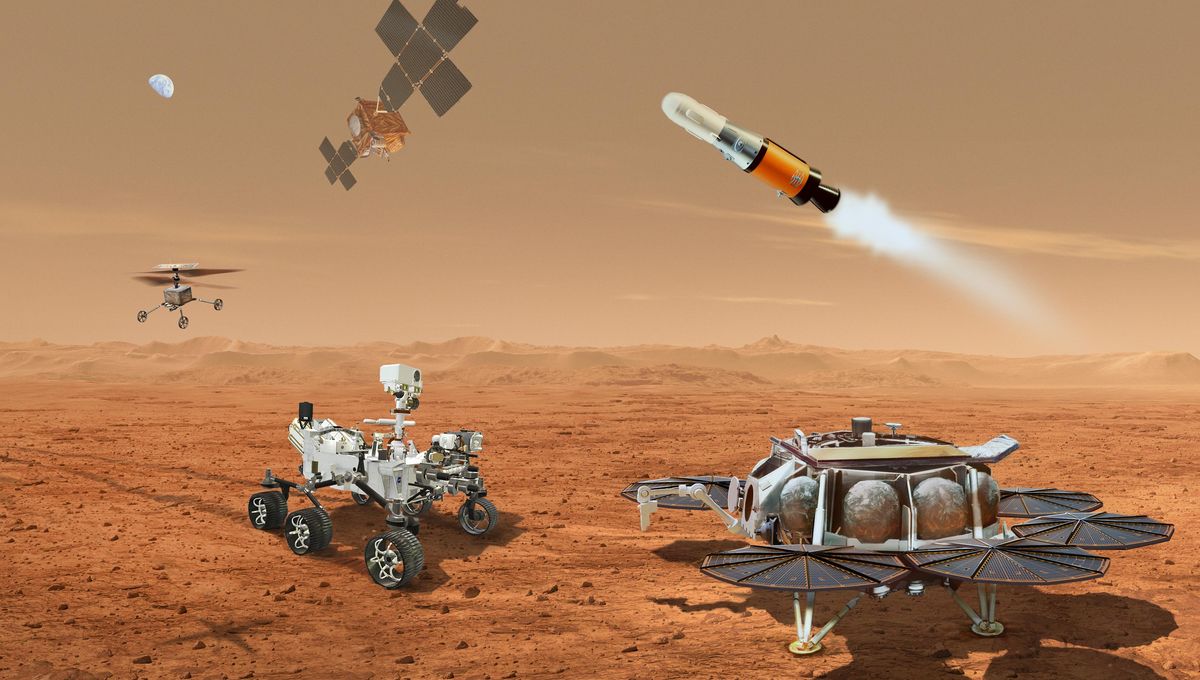
The Mars Sample Return (MSR) mission is one of the most ambitious projects that NASA, in partnership with the European Space Agency (ESA), has planned. The idea is to get two helicopters to Mars to pick up samples collected by Perseverance, pack them in a rocket, attempt the first rocket launch from another planet, get into orbit, fly back to Earth, and crash land somewhere (safer than using a parachute).
The MSR is a mission that would bring pristine Martian material to Earth for the first time, allowing analysis of it with the most sophisticated equipment. We might even be able to tell if there ever was life on Mars. But bringing the samples here is an enormous technical challenge, and an independent review board reports that said challenge is currently not being met.
“MSR is a deep-space exploration priority for NASA, in collaboration with ESA. However, MSR was established with unrealistic budget and schedule expectations from the beginning. MSR was also organized under an unwieldy structure,” the report from the review board states.
“As a result, there is currently no credible, congruent technical, nor properly margined schedule, cost, and technical baseline that can be accomplished with the likely available funding.”
The board was instituted in May 2023. Its job was to establish if the current budget, schedule, and technical development were in agreement with the mission outline. They provided NASA with 20 findings and 59 recommendations.
The review is not negative for the sake of negativity. It stresses that the current plans are “intelligently constructed,” and advised a shift of the current launch schedule to a later window, moving it to 2030. This will increase its budget significantly and it will certainly cause rumbles in Washington, as the US Senate reportedly already expressed little sympathy for MSR and its costs over the summer.
“Mars Sample Return is a very complex program and campaign with multiple parallel developments, interfaces, and complexities,” Orlando Figueroa, chair of the independent review board, said in a statement. “The development of this historic effort follows many decades of strategic investment.”
A delay might mean a significant growth in budget, which might eat into the rest of the planetary science budget, putting other missions at risk. But cancelling doesn’t mean that all possible money will be given to said missions.
“NASA must address this concern while clarifying and dispelling the notion that cancelling MSR necessarily means greater budgets for everybody else,” the report adds. “Cancellation may also call into question the feasibility of other ambitious sample return efforts envisioned by the planetary science community.”
NASA has now organized a team to look at the report and make recommendations on the path forward, making sure MSR works as a mission and fits with the wider objectives of the space agency.
“Independent review boards like the one we commissioned for Mars Sample Return help review whether we’re on the right track to meet our mission goals within the appropriate budget,” added the leader of the newly assembled team Sandra Connelly, who is NASA’s deputy associate administrator for science. “We thank the board for its work, and now our job is to assess the report and address if there are elements of the program that need to change.”
The independent review board’s Mars Sample Return report is available online.
Source Link: The Mars Sample Return Mission Is In Trouble